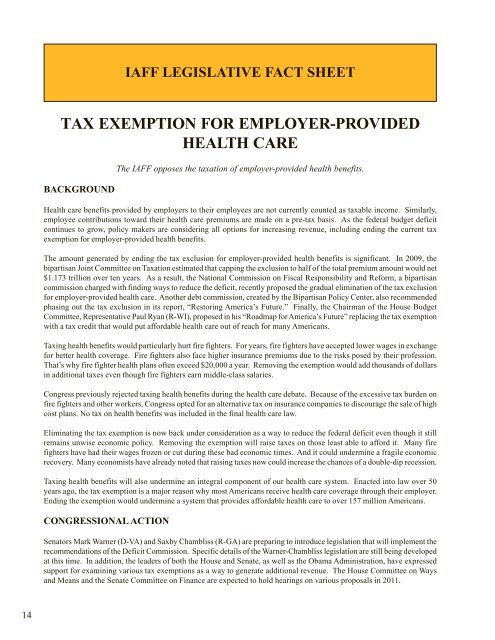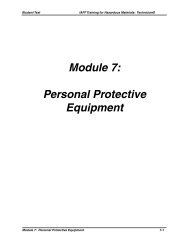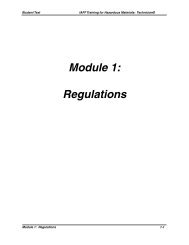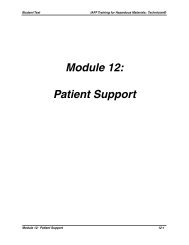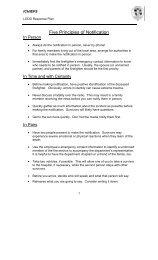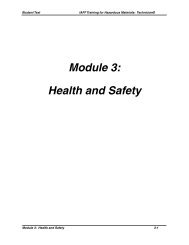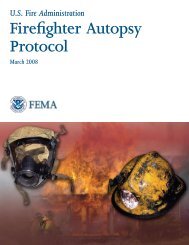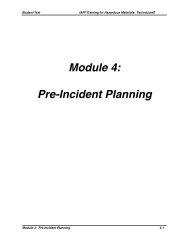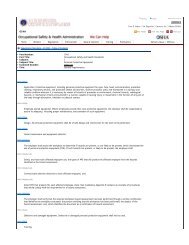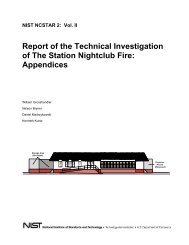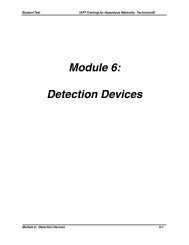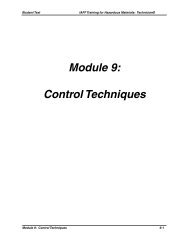2011 Fire Fighters Issues Book.pmd - IAFF
2011 Fire Fighters Issues Book.pmd - IAFF
2011 Fire Fighters Issues Book.pmd - IAFF
You also want an ePaper? Increase the reach of your titles
YUMPU automatically turns print PDFs into web optimized ePapers that Google loves.
<strong>IAFF</strong> LEGISLATIVE FACT SHEET<br />
TAX EXEMPTION FOR EMPLOYER-PROVIDED<br />
HEALTH CARE<br />
BACKGROUND<br />
The <strong>IAFF</strong> opposes the taxation of employer-provided health benefits.<br />
Health care benefits provided by employers to their employees are not currently counted as taxable income. Similarly,<br />
employee contributions toward their health care premiums are made on a pre-tax basis. As the federal budget deficit<br />
continues to grow, policy makers are considering all options for increasing revenue, including ending the current tax<br />
exemption for employer-provided health benefits.<br />
The amount generated by ending the tax exclusion for employer-provided health benefits is significant. In 2009, the<br />
bipartisan Joint Committee on Taxation estimated that capping the exclusion to half of the total premium amount would net<br />
$1.173 trillion over ten years. As a result, the National Commission on Fiscal Responsibility and Reform, a bipartisan<br />
commission charged with finding ways to reduce the deficit, recently proposed the gradual elimination of the tax exclusion<br />
for employer-provided health care. Another debt commission, created by the Bipartisan Policy Center, also recommended<br />
phasing out the tax exclusion in its report, “Restoring America’s Future.” Finally, the Chairman of the House Budget<br />
Committee, Representative Paul Ryan (R-WI), proposed in his “Roadmap for America’s Future” replacing the tax exemption<br />
with a tax credit that would put affordable health care out of reach for many Americans.<br />
Taxing health benefits would particularly hurt fire fighters. For years, fire fighters have accepted lower wages in exchange<br />
for better health coverage. <strong>Fire</strong> fighters also face higher insurance premiums due to the risks posed by their profession.<br />
That’s why fire fighter health plans often exceed $20,000 a year. Removing the exemption would add thousands of dollars<br />
in additional taxes even though fire fighters earn middle-class salaries.<br />
Congress previously rejected taxing health benefits during the health care debate. Because of the excessive tax burden on<br />
fire fighters and other workers, Congress opted for an alternative tax on insurance companies to discourage the sale of high<br />
cost plans. No tax on health benefits was included in the final health care law.<br />
Eliminating the tax exemption is now back under consideration as a way to reduce the federal deficit even though it still<br />
remains unwise economic policy. Removing the exemption will raise taxes on those least able to afford it. Many fire<br />
fighters have had their wages frozen or cut during these bad economic times. And it could undermine a fragile economic<br />
recovery. Many economists have already noted that raising taxes now could increase the chances of a double-dip recession.<br />
Taxing health benefits will also undermine an integral component of our health care system. Enacted into law over 50<br />
years ago, the tax exemption is a major reason why most Americans receive health care coverage through their employer.<br />
Ending the exemption would undermine a system that provides affordable health care to over 157 million Americans.<br />
CONGRESSIONAL ACTION<br />
Senators Mark Warner (D-VA) and Saxby Chambliss (R-GA) are preparing to introduce legislation that will implement the<br />
recommendations of the Deficit Commission. Specific details of the Warner-Chambliss legislation are still being developed<br />
at this time. In addition, the leaders of both the House and Senate, as well as the Obama Administration, have expressed<br />
support for examining various tax exemptions as a way to generate additional revenue. The House Committee on Ways<br />
and Means and the Senate Committee on Finance are expected to hold hearings on various proposals in <strong>2011</strong>.<br />
14


